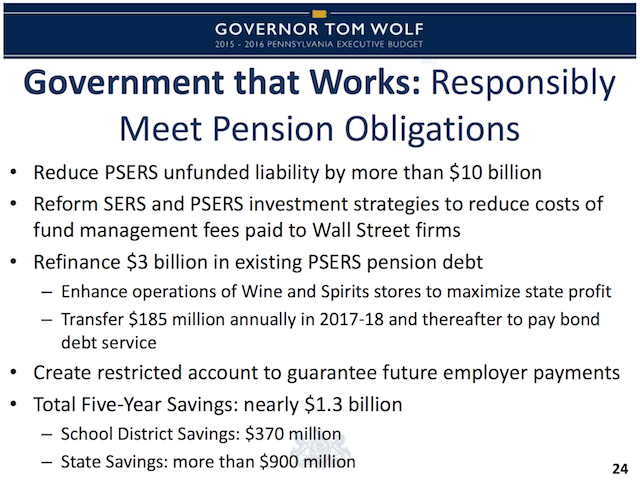Pennsylvania Governor Tom Wolf has proposed a state budget that would close $10 billion in unfunded pension liabilities by cutting investment fees, refinancing debt, and boosting liquor sales.
The “commonsense reforms” mean its two state pension plans would have to “seek less costly passive investment approaches where appropriate,” according to the budget.
Pennsylvania’s employee and teachers’ pensions together have upwards of $50 billion in unfunded pension liabilities. Wolf’s budget blamed the growing gap primarily on “repeated decisions by policy makers to delay making the required contribution to fund our future pension obligations.”
The state has not paid its full pension bill for more than 15 years, the budget document noted.
While the proposal was light on specifics for reforming pension investment strategy, the outcome would “significantly reduce taxpayer costs for professional fund managers,” it claimed.
The state largest plan, the $52 billion Public School Employees’ Retirement System, already managed roughly a quarter of its assets in-house, as of June 2014. Its portfolio included relatively standard allocations to fee-heavy asset classes, such as private equity (16.3%) and real estate (13.8%).
Net-of-fees, the teachers’ pension returned an annualized 10.3% over the last five years.
Beyond reforms to “prudently maximize future investment returns through cost effective investment strategies,” the governor also proposed refinancing $3 billion in existing debt to take advantage of low interest rates.
The final element of Wolf’s plan to fund liabilities had nothing to do with the retirement system.
In a section titled “Modernizing Pennsylvania’s Wine and Spirit Systems,” the governor proposed enhancing its state-owned liquor stores to boost sales and maximize profits. By adding Sunday hours and “competitive pricing,” Wolf budgeted enough additional sales to service the refinanced $3 billion pension bond.

Source: Commonwealth of Pennsylvania 2015-2016 Executive Budget
